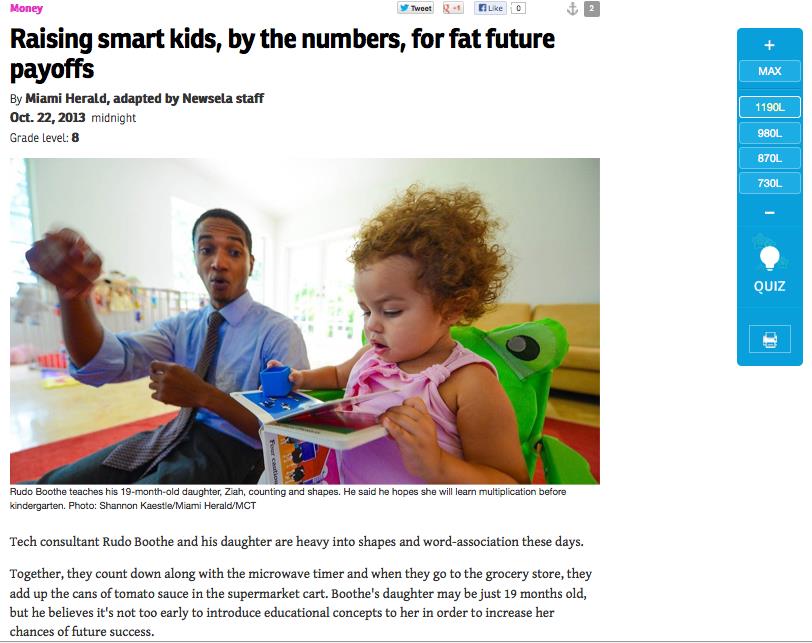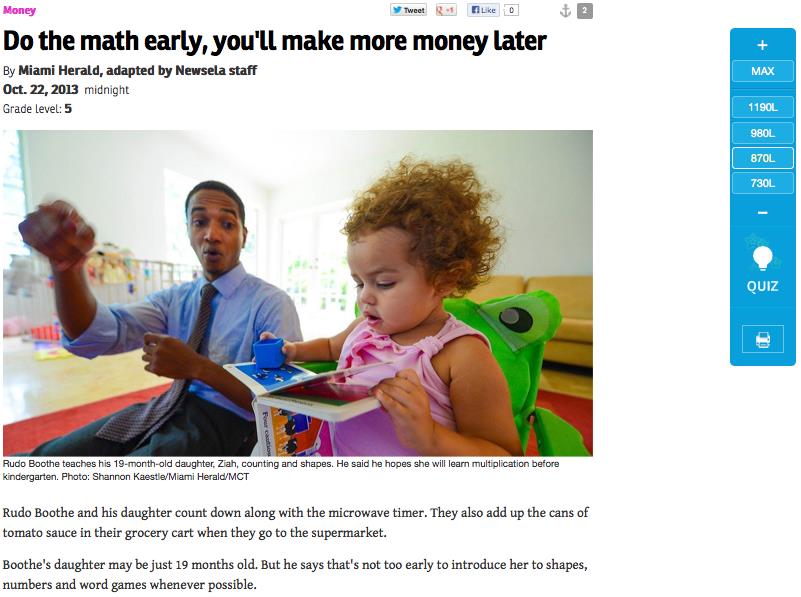There are literally thousands of excellent websites available to educators these days, but every so often one comes along that provides something you’ve quietly wished for all your career. For me, NEWSELA, currently in beta and free, is one of those finds.
Just in time for the Common Core emphasis on non-fiction reading, NEWSELA provides daily current events articles written specifically for K-12 students. Each day the site adds three new articles to their collection, which includes the categories War and Peace, Money, Kids, Science, and Law. But here’s the highlight: for every article there are versions written at several different Lexile levels. With just a few clicks, a teacher can provide the same story leveled for students of differing ability. For example, here is a story I might use with my 8th graders, written at a Lexile of 1180:

And below is the same story “translated” into a Lexile of 870:

That alone makes NEWSELA a highly valuable resource for a teacher working to meet individual student needs. But there are more tools available. The site has a search option, making it possible for students doing online research to locate accessible news articles on specific topics. A teacher can also set up classes, register individual students in each class (no student emails required), assign articles to classes, and monitor student work. Once a student has an account, she can join more than one class, so it’s possible for teachers of different subject areas to use the site with the same students.
Once students are logged in, they can highlight and save articles, and teachers have access to view those. There are even brief online comprehension quizzes for many of the articles, and teachers can monitor those scores as well. A “Binder” tab at the top of the teacher’s page allows for a search of student activity “by article” or “by student,” so it’s simple for a teacher to monitor individual reading logs and quiz results. And because NEWSELA is a current events site with new articles appearing every day, teachers across the curriculum, within the same building and at different levels, can integrate this site into their courses without concern that a previous teacher has already used the materials. It’s a site everyone can share!
At this time NEWSELA is optimized for iPhone and iPad, and quizzes are available on iPad only. But according to the NEWSELA site, Android optimization is coming soon. There is also a NEWSELA Facebook page, where ideas for implementing class activities are readily available and a network of practicing teachers provides suggestions and guidance.
Now, I would be one of the first to argue that Lexile levels are a somewhat narrow measure by which to judge a text’s complexity. But I do have students whose limited vocabulary and fluency makes it difficult for them to read texts at grade level. The ability to level their texts (see Paul Morsink’s excellent TILE-SIG post on the Digital ZPD) without having to sacrifice their participation in meaningful group dialogue is a huge affordance.
One of my favorite methods for teaching shared inquiry into a text is the Socratic Seminar, in which the students work together to question, discuss, read closely, and make meaning of rich texts and the issues they raise. With NEWSELA, all my students can participate in relevant conversations about current events, form opinions about their world, and become civic participants—using resources appropriate for them. What’s more powerful than that?
 Angie Johnson is a doctoral student in Educational Psychology and Educational Technology at Michigan State University and teaches 8th grade Language Arts at Lakeshore Middle School, in Stevensville, MI, ajohnson@lakeshoreps.org.
Angie Johnson is a doctoral student in Educational Psychology and Educational Technology at Michigan State University and teaches 8th grade Language Arts at Lakeshore Middle School, in Stevensville, MI, ajohnson@lakeshoreps.org.
This article is part of a series from the International Reading Association Technology in Literacy Education Special Interest Group (TILE-SIG).